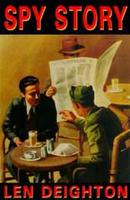
Spy Story, by Len Deighton, Read by Robert Whitfield, Blackstone Audio, 2000
What is it with these British spy novelists? Modern spy stories, specifically of the American vein, are typically testosterone-brimming, gadget-wanking Cretin-A-Thons in which all the work of spying is managed by a few rubber noses, a silicon-based transmitter, a few ounces of plasticine explosives, and some rock-hard abs. While British historian, Len Deighton doesn’t provide readers with the kind of from-the-inside access that John le Carré brings to his work, he brings to the table the historian’s long-range view and the sense of bigger forces at work than merely governmental.
He also carries to his novels another ingredient solely lacking in many spy thrillers: a sense of humor. It is, of necessity, the kind of dry British wit, and this novel, a Harry Palmer book (most well known for the Michael Caine films) is perhaps less humorous than previous, but on more than one occasion I laughed out loud at a wry phrase or scenario. Alas, that they are all so contextually based that if I were to type out the lines that tickled me, they’d probably lie flat on the screen, devoid of mirth, a sort of disconnected thing. The best I can dig out is this bon mot: “I had the feeling she wanted me to confess that I couldn’t live without her, and the moment I did she’d leave me.”
Such is the quality of a Deighton book that mood and tone are so seamlessly interwoven with characters and events that the prose doesn’t so much sparkle as hang there unseen, a verbal scrim of near-complete transparency. The book is written in first person, which is, to my mind, a better way to tell a spy story in many respects. The ignorance of the narrator reads more naturally than third person or omniscient in which an assumed elision is preeminent. You, like the narrator, work benightedly trying to piece together the bits, trying to discover the outline of the puzzle from random pieces. In this way, this kind of spy story is more akin to a mystery than a thriller, though sharing elements of both, a trait forgotten it seems these days. As such, when something dangerous happens, it is given the added frisson of excitement for being out of place though never out of mind. We always believe that in a spy story, no matter how refined or intellectualized, someone is going to eat lead.
The plot is a multi-threaded affair involving a Russian defector, an impersonator for the narrator occupying his old flat, his staggering romance, and inter-departmental squabbling at the narrator’s office. Pat Armstrong, our narrator, also known as Harry Palmer, the protagonist of Deighton’s first four novels, has basically quit the life and is now clock punching at an intelligence examination division of British counterintelligence doing historical analysis of previous battles and engagements to learn as much as possible from computer modeling. If that sounds fairly removed from action, it is, and it’s this life Armstrong/Palmer’s chosen deliberately as a kind of faux renunciation of the life of espionage and intrigue.
What’s plaguing Palmer at this stage is an ability to commit to any particular action or course other than a sort of holding pattern of non-doing. His relationship with a young woman strolls on and she is fed up with waiting; his job is a perfect waste of his skills and talents, and he knows it; he is promoted to flunky for the American colonel Charles Schlegel the third who is taking over his employer as part of a NATO re-arrangement and he merely yes-man’s his way through it to the disgust of his former coworker. All of this while forces are moving in the background, using his identity as a possible alias for a defecting Russian nuclear submarine commander, while high-level talks are engaged for possible reunification of East and West Germany, and while a shadow group in British intelligence may be plotting treason. Like the le Carré from earlier, this book also takes place against the backdrop of reunification talks, which apparently stretched on forever.
While Deighton’s story doesn’t lack for the human angle, it is remarkably able at dropping in the larger world around them in a way quite similar to human life. We only grasp one small piece of the story, one tiny perspective in a fragmented multi-level world, and the first person narrative drives that home in a way that is particular and intimate without feeling cluelessly adrift. The novel’s double and triple-cross ending sketch a paranoiac’s dream-life in which no one can be trusted for absolute certainty and underscore that element of not fully knowing what motivates those around you and those against which you fight.
Narrator Robert Whitfield gives us the kind of no-frills reading that is the hallmark of Blackstone Audio. His voice is clear, without artifice, and easy on the ears, but he works too little to seduce the reader. While Deighton’s style is itself not overly given to raptures, that puts the ball in the narrator’s court to tease out every last nuance and feeling. The average Blackstone reader isn’t up to such a task, and while Whitfield does his level best, the results are merely adequate.
No comments:
Post a Comment